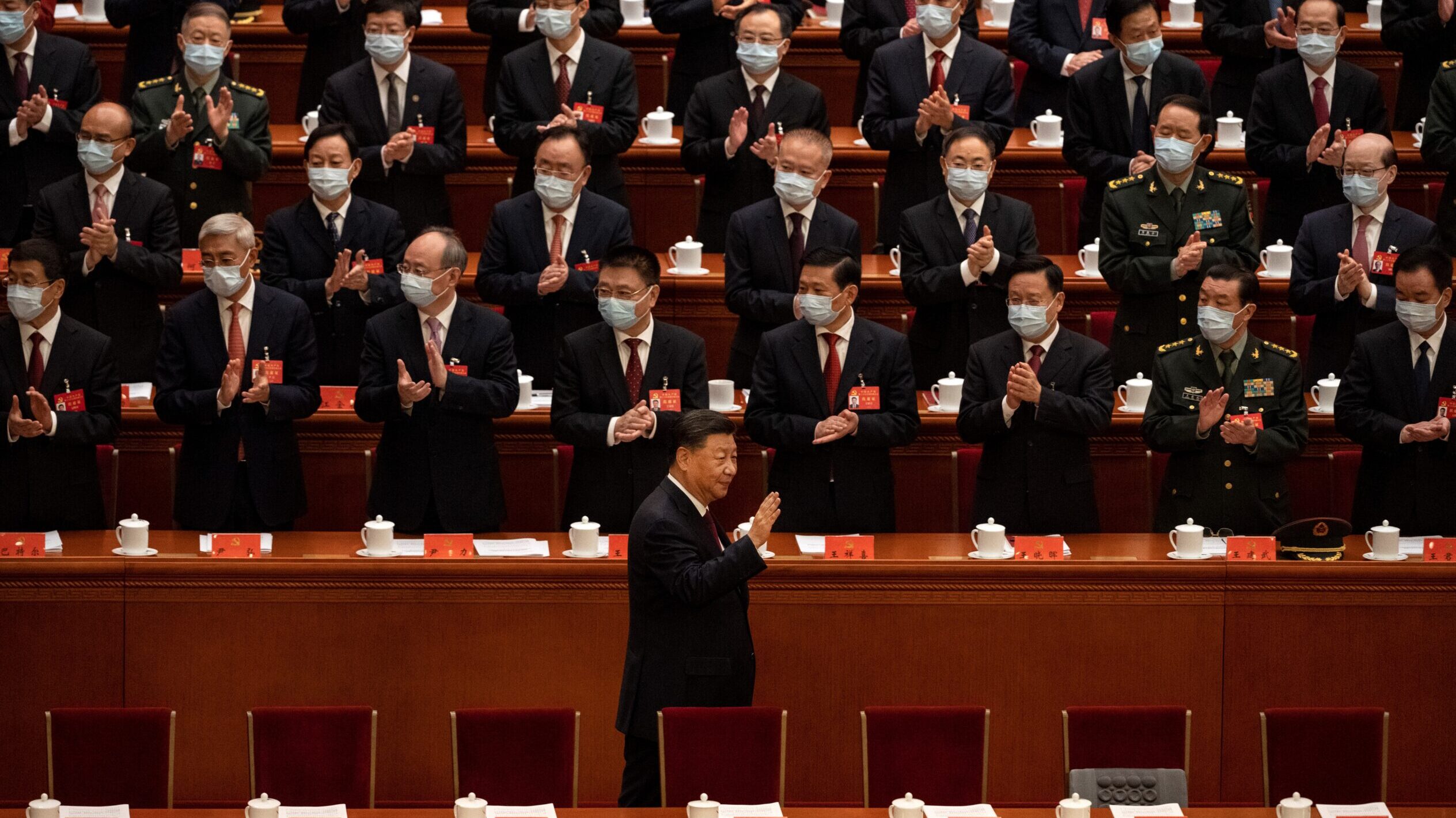
Chinese President Xi Jinping is applauded as he waves to senior members of the government upon arrival at the Opening Ceremony of the 20th National Congress of the Communist Party of China at The Great Hall of People on October 16, 2022 in Beijing, China. (Kevin Frayer/Getty Images)
WEST 2023 — Following a week where most of the country’s attention was transfixed on a high-altitude balloon deployed by the Chinese government, a top Navy intelligence officer said it is “unsettling” how blind most Americans have become to the threat China poses.
“I’ll be very honest with you. It’s very unsettling to see how much the US is not connecting the dots on our number one challenge,” Rear Adm. Mike Studeman, the commander of the Office of Naval Intelligence, told attendees here at the West 2023 conference in San Diego.
“It’s disturbing how ill-informed and naïve the average American is on China. I chalk this up, if I could summarize, into a China blindness. We face a knowledge crisis and a China blindness problem,” he continued.
Studeman’s blunt comments come as the White House, the Pentagon and the country at-large deal with the fall-out of a Chinese high-altitude balloon that violated US airspace. The Chinese government claimed the first balloon, shot down over the Atlantic Ocean near South Carolina, was used for civilian scientific research and went severely off-course, while the Pentagon has said the balloon was an intelligence, reconnaissance and surveillance asset.
Following an F-22’s takedown of the balloon with an AIM-9X Sidewinder missile earlier this month, the White House and the Canadian government has been much more aggressive in publicly announcing and promptly taking down other unknown objects detected in NORAD airspace. Three more objects have been destroyed since, although the government has avoided attributing those objects to China.
RELATED: Chinese balloons have been ‘transiting’ Middle East, top general says
When asked to comment on the balloon saga, Studeman said the remarkable sight of a foreign nation’s asset flying freely above American territory has “woken up a few” people, but he was also disappointed by how “narrow” the discussion around the event had become.
“We should be connecting the Chinese view of how to use their capabilities to all the other areas where the Chinese have either ignored, or they intend to subvert, forms of international law,” he said. “I guarantee you if they’d been successful with operating all over the place, and they had been for quite some time, that they’d be talking about redefining what sovereign airspace really is.”
Studeman blamed part of the problem with “China blindness” on the Pentagon’s propensity to classify large swaths of information at higher levels than necessary, an issue with which lawmakers in recent months have become increasingly attuned.
“Frankly, I’ve been in a struggle for some time with the Intelligence Community to be able to actually downgrade some of the things that we see that are truly damning with regard to what the Chinese are doing and why they’re doing it, and get those out into the public domain,” he said.
Despite speaking mostly about China for roughly 40 minutes, Studeman for much of that time did not mention the one issue that has garnered significant public attention in recent years: The possibility of a military invasion of Taiwan.
When he did address Taiwan though, the career intelligence officer pushed back on recent statements that the US should take a position of “strategic clarity.” The US has long held a position of not clearly declaring what it might do if China attempted to forcibly reunify Taiwan through military force.
Some observers, most notably retired Navy Adm. Harry Harris Jr., have taken the position that the US should drop this position and make its intentions clear under such a situation.
“I think this issue of strategic clarity versus strategic ambiguity is critical, and we have been well served” by ambiguity, Harris told lawmakers last week, according to the Washington Examiner. “But I think the time for ambiguity is over. I think we have to be clear about our intent with regard to what would happen if the [People’s Republic of China] invades Taiwan as the PRC is clear in its intent that it’s ultimately going to seize Taiwan, if need be.”
RELATED: America and China: Whose timeline is it anyway?
Studeman today did not name Harris or any other individual when talking about his position that the US should continue its policy of “strategic ambiguity.” But he also did not mince words that it is “not the time for strategic clarity.”
“It makes no sense… It doesn’t buy you a deterrence. The Chinese already think that the US is going to intervene if they do a military operation against Taiwan because they’re building a military designed to handle US intervention,” Studeman said.
“What you may do, in fact, is actually tie the [US] president’s hands… You’re giving a blank check even though you don’t know the circumstances of how you may face a situation where you may want to commit US forces,” he continued.
The two-star admiral finished his remarks with a plea, ostensibly, although not explicitly, aimed at the lawmakers and other elected officials who have very much dominated the public discussion of the country’s policy decisions regarding the Chinese government.
“Can we please lower the amount of internal bickering within the United States and focus on the international challenges that actually affect every American?” he said.








